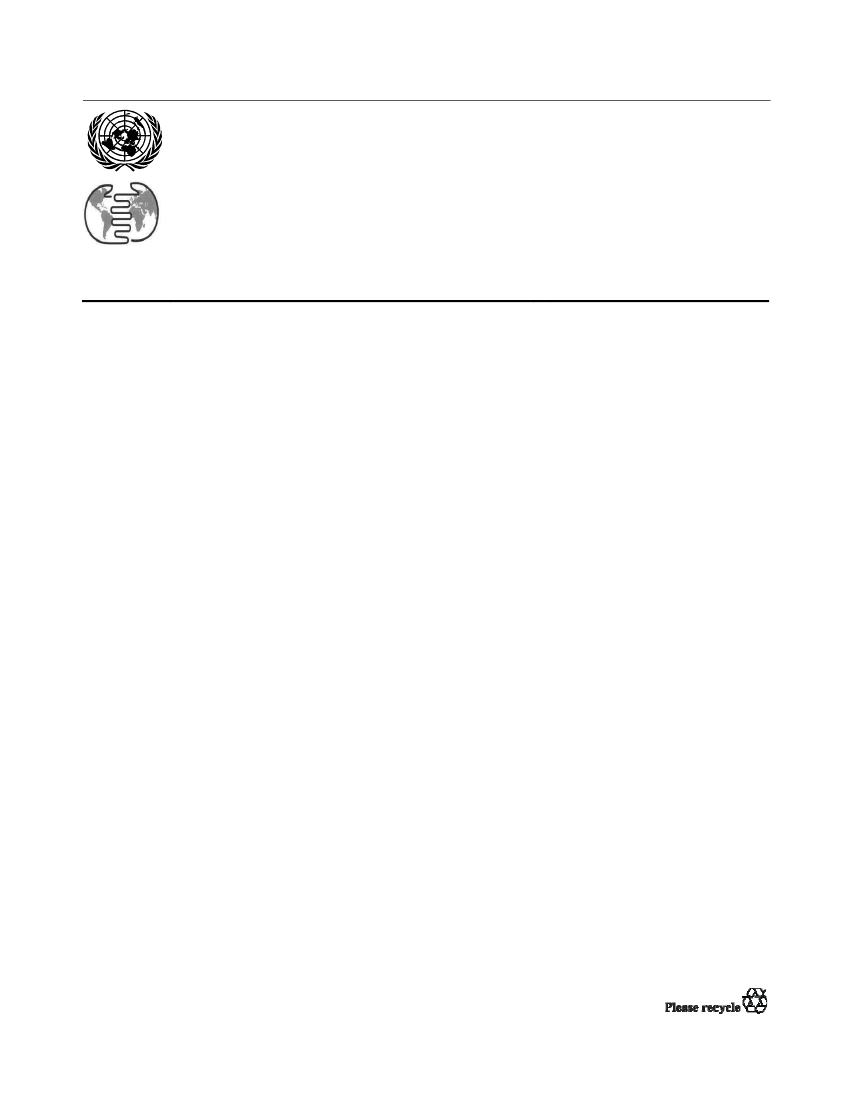Udenrigsudvalget 2010-11 (1. samling)
URU Alm.del Bilag 205
Offentligt
United Nations
A/CONF.219/L.1Distr.: Limited12 May 2011Original: English
Fourth United Nations Conferenceon the Least Developed CountriesIstanbul, Turkey9-13 May 2011
Agenda item 8Consideration of the draft outcome documentsof the Conference
Draft Istanbul DeclarationRenewed and strengthened global partnership for thedevelopment of least developed countriesWe, the Heads of State and Government and Representatives of the Statesparticipating in the Fourth United Nations Conference on the Least DevelopedCountries,Gatheredhere in Istanbul from 9 to 13 May 2011 to reiterate our commitmentto the collective and shared responsibility to uphold the principles of human dignity,equality and equity at all levels,Stressingthat the least developed countries continue to confront high levels ofpoverty and hunger, and reaffirming that solidarity and partnership with the poorest,weakest and most vulnerable countries and their people are not only moral andethical imperatives, but also economic and political ones, which correspond to long-term interests of the international community and serve the cause of peace, securityand prosperity for all,Emphasizingthat enhancing good governance at all levels, the rule of law,respect for all human rights, including the right to development, gender equality,justice for all, democracy and peace and security are essential for sustainabledevelopment,Underscoringthe fact that while each faces specific challenges, all leastdeveloped countries share much in common,Recognizingthe progress made by least developed countries since the ThirdUnited Nations Conference on the Least Developed Countries held in Brussels in2001,Recognizingthat not all the objectives and goals set in the BrusselsProgramme of Action have been fully achieved and that least developed countriesremain marginalized in the world economy and continue to suffer from extremepoverty, inequality and structural weaknesses,
11-34597 (E) 240511
*1134597*
Expressing deep concernthat many least developed countries, particularlythose that are affected by conflict and criminal activities and transnational organizedcrime, including piracy, which, among other things, can threaten trade routes, andsmuggling of and trafficking in human beings, narcotic drugs and small arms andlight weapons, are lagging behind in the achievement of the internationally agreeddevelopment goals, including the Millennium Development Goals, and recognizingthat these challenges require concerted efforts to address them,Underliningthat limited productive capacity and financial resources, and weakand poor infrastructure, continue to pose serious obstacles to the developmentefforts of the least developed countries,Reiterating our deep concernthat the ongoing impacts of economic andfinancial crisis, combined with volatile energy and food prices, problems of foodsecurity, rising unemployment and increasing challenges posed by climate change,natural disasters and the loss of biodiversity, are threatening the development gainsthat least developed countries made arduously over the years,Recognizingthat least developed countries deserve particular attention andspecial and well-targeted support in line with their development strategies to addresstheir development needs and specific challenges in a coherent manner in trade,investment, finance, including official development assistance (ODA), technologyand capacity-building,Expressingour full support for least developed countries’ development effortsto achieve people-centred sustainable development,Underscoringthat least developed countries represent an enormous untappedhuman and natural resource potential, in particular their young populations, tocontribute to national development, poverty eradication, and job creation, as well asglobal economic growth and welfare,Recognizingthe need for enhancing the voice and participation of leastdeveloped countries in relevant multilateral institutions and international forums,Emphasizingthe importance of the outcomes of all major United Nationsconferences and summits in the economic, social and related fields, including theMillennium Declaration, the Monterrey Consensus of the International Conferenceon Financing for Development, the Plan of Implementation of the World Summit onSustainable Development (“Johannesburg Plan of Implementation”), the DohaDeclaration on Financing for Development and the outcome document of the High-Level Plenary Meeting on the Millennium Development Goals, which play a vitalrole in shaping a broad development vision of the United Nations and constitutecomplementary frameworks for the development activities of least developedcountries,Having adopteda Programme of Action for the Least Developed Countries forthe decade 2011-2020,Declarethat:1.We collectively commit to finding lasting solutions to the complex andmutually exacerbating challenges and problems of the least developed countries. Weare committed to assisting the least developed countries with an overarching goal ofenabling half of them to meet the criteria for graduation through the eradication of
11-34597
poverty and the achievement of accelerated, sustained, inclusive and equitablegrowth and sustainable development. Thus, we solemnly commit ourselves toimplementing this Programme of Action throughout the coming decade.2.We are convinced that the Fourth United Nations Conference on the LeastDeveloped Countries and the Istanbul Programme of Action provide positivemomentum for the sustainable development of least developed countries byenhancing solidarity with the cause of least developed countries and increasingawareness of their specific conditions. Our renewed and strengthened globalpartnership will make a significant contribution to the common endeavours towardsthe implementation of the Istanbul Programme of Action and the achievement ofinternationally agreed development goals, including the Millennium DevelopmentGoals.3.We stress that the goals and targets of this Programme of Action can beachieved with renewed and strengthened global partnership, enhancedcommitments, increased mobilization of resources for least developed countries’development and greater aid effectiveness. We commit to further strengthening oursupport to least developed countries in creating a favourable environment forsustainable development, increasing productive capacities, the diversification ofeconomies and building necessary infrastructure.4.We underscore that the ownership, leadership and primary responsibility fordevelopment in least developed countries rests with the least developed countriesthemselves. Good governance, inclusiveness and transparency, as well as domesticresource mobilization, are central to the development process of the least developedcountries. These efforts need to be given concrete and substantial internationalsupport in a spirit of shared responsibility and mutual accountability throughrenewed and strengthened global partnership.5.We recognize least developed countries’ efforts to make progress in human andsocial development, including providing access to essential services such aseducation, health, water and sanitation, and shelter, as well as promotingparticipation in social, economic and political life. We encourage further progress inthese areas.6.We underline that gender equality and the empowerment of women and girlsare central to achieving better development outcomes, including all internationallyagreed development goals as well as the Millennium Development Goals, and areessential to making progress towards social and human development and theeradication of poverty in least developed countries.7.We affirm that ODA has a key role to play in support of least developedcountries’ development. In this regard, donor countries take upon themselves tofulfil all the ODA commitments to the least developed countries. They shouldreview their ODA commitments in 2015 and consider further enhancing theresources for the least developed countries.8.We recognize that productive capacity-building is a development multiplierand that the renewed and strengthened partnership should give priority to this issuein the next decade in a coherent manner. In this regard:(a) We underscore that reliable and affordable infrastructure services such aselectricity, transport, information and communications technology and water, as well
11-34597
as institutional capacity, are critically important for building viable productivecapacity in the least developed countries;(b) We underline that a dynamic, well-functioning and socially responsibleprivate sector, small and medium-sized enterprises in particular, and an appropriatelegal framework are crucial in promoting entrepreneurship, investment, competition,innovation and economic diversification as well as achieving full and productiveemployment and decent work for all; are committed to creating conducive domesticand international environments in which the private sector can invest and contributemore to economic growth and sustainable development; and take note of thecontributions of the High-Level Meeting on Investment and Partnerships, the GlobalBusiness Partnership Forum and the Trade Fair at the Fourth United NationsConference on the Least Developed Countries;(c) We recognize the importance of the mobilization of domestic andexternal financial resources, including ODA, foreign direct investment, concessionallending and private flows such as remittances, as vital parts of national andinternational development efforts; and underline the need for enhanced support forinvestments, including capacity-building, to improve the environment forinvestment in productive sectors and infrastructure that would help the leastdeveloped countries in diversifying their economies;(d) We undertake to promote access of least developed countries toknowledge, information, technology and know-how and to support the leastdeveloped countries in improving their scientific and innovative capacity needed fortheir structural transformation; agree to undertake a joint gap and capacity analysiswith the aim of establishing a Technology Bank and a science, technology andinnovation-supporting mechanism dedicated to the least developed countries’building on existing international initiatives; and welcome the generous offer of theGovernment of Turkey to host an International Science, Technology and InnovationCentre and encourage commitments in this regard;(e) We underscore that integrated and sustainable agriculture and ruraldevelopment policies and practices, focusing particularly on small-scale farmers andagro-businesses, as well as increased investments in least developed countries, areessential to the eradication of poverty and hunger and the achievement of food andnutritional security;(f) We acknowledge the great potential of regional economic integration andcooperation in creating new opportunities for trade, investment, production, supplychains, and markets through improved infrastructure and connectivity; andunderscore that regional integration and cooperation efforts involving leastdeveloped countries should be further enhanced and supported with thecontributions of relevant regional organizations and institutions.9.We reaffirm that international trade remains a key driver of economic growthand sustainable development in least developed countries. We strongly call on allWorld Trade Organization members to intensify their negotiating efforts to bring theWorld Trade Organization Doha Round to a successful conclusion. We commit tothe realization of the timely implementation of duty-free and quota-free marketaccess, on a lasting basis, for all least developed countries, consistent with the HongKong Ministerial Declaration adopted by the World Trade Organization in 2005. Wecommit to ensuring that preferential rules of origin applicable to imports from least
11-34597
developed countries are simple, transparent and predictable and contribute tofacilitating market access. We emphasize the need for implementing effective trade-related technical assistance and capacity-building to least developed countries on apriority basis, including by enhancing the share of assistance to least developedcountries for aid for trade and support for the Enhanced Integrated Framework, asappropriate, to help least developed countries to build their supply-side capacity,trade-related infrastructure and trade facilitation. In this regard, we emphasize therole of all relevant international agencies and organizations. We also underline thatthe accession of least developed countries to the World Trade Organization shouldbe encouraged and facilitated.10. New innovative finance mechanisms have potential to contribute to thedevelopment of least developed countries. Such voluntary mechanisms should beeffective and should aim to mobilize resources that are stable and predictable, whichshould supplement and not be a substitute for traditional sources of finance and bedisbursed in accordance with the priorities of least developed countries and notunduly burden them.11. We are concerned that many least developed countries still struggle with a highdebt burden. This situation demands the continued implementation of bold andcomprehensive measures with a view to addressing the debt challenges of leastdeveloped countries effectively and equitably. Long-term sustainability of debtdepends on, inter alia, responsible lending and borrowing by all creditors anddebtors, sustainable economic growth, structural transformation in least developedcountries and enhanced market prospects for least developed countries.12. We emphasize the urgent need to strengthen the capacity of least developedcountries in building long-term resilience to mitigate crises and effectively respondto economic shocks. We underline the need for appropriate regional andinternational support to be deployed in a timely and targeted manner to complementleast developed countries’ efforts to this end, such as the support mechanismsdesigned and implemented by international financial institutions, including regionaldevelopment banks and others.13. We acknowledge the adverse impact of climate change on least developedcountries and share the aim to strengthen their capacity to adapt to and mitigateclimate change, bearing in mind the provisions of the United Nations FrameworkConvention on Climate Change. The mobilization and provision of additional,adequate and predictable financial resources are necessary to address leastdeveloped countries’ adaptation and mitigation needs. We welcome the decision toestablish the Green Climate Fund and are looking forward to its fulloperationalization. We also acknowledge the need to reduce their vulnerability tonatural disasters through disaster preparedness and risk reduction, as well asresilience-building. We also underscore the need for access of the least developedcountries to appropriate, affordable and clean technologies that foster their sustainedeconomic growth and sustainable development.14. We recognize that the graduation process of least developed countries shouldbe coupled with an appropriate package of incentives and support measures so thatthe development process of the graduated country will not be jeopardized. In thiscontext, we will work on the development and implementation of smooth transitionstrategies for graduating and graduated least developed countries. We look forward
11-34597
to the establishment of an ad hoc working group to further study and strengthen thesmooth transition process.15. In view of the increasingly important role of South-South cooperation in leastdeveloped countries’ development, we underline the need to fully harness theopportunities offered by South-South cooperation as a complement to, but not asubstitute for, North-South cooperation. We are convinced that least developedcountries benefit from enhanced and mainstreamed triangular cooperation. We seekto achieve specific development results as articulated in least developed countries’national development plans and priorities, based on solidarity and partnership withinthe context of South-South cooperation.16. We acknowledge the important role of parliaments in debating developmentstrategies, as well as in overseeing their implementation. The engagement ofparliaments will ensure effectiveness, transparency and accountability in the design,the implementation and the review of the policies and programmes in the context ofthe Istanbul Programme of Action. We take note of the Parliamentary Message tothe Fourth United Nations Conference on the Least Developed Countries.17. We call on civil society, including non-governmental organizations, voluntaryassociations and philanthropic foundations, the private sector, academia and otherrelevant stakeholders at all levels to enhance their roles in the development effortsof least developed countries, as appropriate. We also take note of the Civil SocietyForum Declaration of the Fourth United Nations Conference on the Least DevelopedCountries.18. We reaffirm the critical importance of effective and efficient follow-up andmonitoring mechanisms at the national, regional and global levels to assess progressin the implementation of commitments and actions contained in the Programme ofAction, including by conducting a high-level comprehensive midterm review. Weinvite the Secretary-General of the United Nations to ensure that the IstanbulProgramme of Action is followed up in an effective, efficient and visible manner.
11-34597






